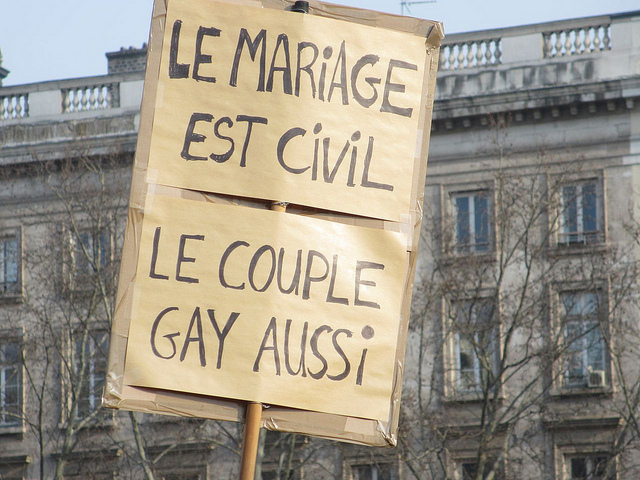 Why do some countries have culture wars over morality issues such as abortion and same-sex marriage, while other countries hardly experience any conflict at all? This book argues that morality issues only generate major conflicts in political systems with a significant conflict between religious and secular parties, because this is required for these issues to become part of party competition. Students and scholars of European policy and moral and ethical issues will come across much of worth within its pages, finds Jennifer Thomson.
Why do some countries have culture wars over morality issues such as abortion and same-sex marriage, while other countries hardly experience any conflict at all? This book argues that morality issues only generate major conflicts in political systems with a significant conflict between religious and secular parties, because this is required for these issues to become part of party competition. Students and scholars of European policy and moral and ethical issues will come across much of worth within its pages, finds Jennifer Thomson.
 Morality Politics in Western Europe: Parties, Agendas and Policy Choices. Isabelle Engeli, Professor Christoffer Green-Pedersen, Lars Thorup Larsen (editors). Palgrave Macmillan.
Morality Politics in Western Europe: Parties, Agendas and Policy Choices. Isabelle Engeli, Professor Christoffer Green-Pedersen, Lars Thorup Larsen (editors). Palgrave Macmillan.
In the wake of recent debates at Westminster over gay marriage, and the continuing controversy over abortion in Ireland, Morality Politics in Western Europe provides a timely contribution to the study of politics and morality. Importantly, it acts as a reminder that the study of morality can be analytically considered within the discipline of Political Science and Government, and can be encompassed within existing frameworks on party politics and policy agenda.
The authors identify two main strands in the tradition of studying morality politics – the first considers the topic primarily within a US context, and a second, more contemporary comparative strand attempts to explain cross-national variation in policy choices on specific morality issues. The authors attempt to build on this literature, by arguing for a consideration of morality politics which encompasses policy agenda-setting theory and literature on party conflicts and cleavages in Western Europe; two contexts rarely used to consider morality issues. As such, this work allows for a far broader and more impactful consideration of moral issues than some work, in that it attempts to show links between moral issues and existing political conflicts in the countries studied. Too often filed away under ‘Religion’ or ‘Culture’, or confined to the discipline of Sociology, the authors provide a rigorous and analytical framework that allows for a deeper consideration of the ways in which moral issues fit into the broader political and policy framework.

The five case studies in this study consider the Netherlands, Spain, Switzerland, Denmark and the UK, with the countries categorised into the authors’ ‘two worlds’ framework as being either religious and secular. The religious world is importantly not defined as countries where a church is a central state actor (such as Britain), but rather countries where religion has been present in the party system – which, in a Western European context, is mainly due to the involvement of Christian Democratic Parties. By contrast, the secular world is a country in which none of the major political parties have religious ties and in which religious questions play little role in party politics. Usefully, the authors also occasionally employ a third frame – the ‘unsecular’ – situations in which religiously based parties are forced to articulate a potentially divisive traditional Christian position using non-religious language – for example, attempts to criticise gay marriage plans by references to traditional, as opposed to religiously based, family values. Such a framework seems especially redolent of contemporary Tory discourse on gay marriage.
The authors define morality issues as those related to the fundamental questions of death, reproduction and marriage. As such, wider moral issues such as warfare or animal rights are not included in their discussion, and the case studies focus on five issues – abortion, assisted reproductive technologies (ART), embryo research, euthanasia, and same-sex marriage and partnership. They focus on the period from the 1960s onwards, and look at the actors involved, the extent to which moral issues feature in party manifestos, parliamentary activities (questions to ministers etc.) and the way in which the issues are framed in party discourse.
The example of Spain highlights a country in which the range of moral issues studied here have all been highly politicised. Interestingly, however, Spain does not have a Christian Democratic party as seen in Germany and parts of Scandinavia. Abortion has featured repeatedly in Spanish political party manifestos since the late seventies. ART and embryo research, as is also true of discourse in the UK, have moved onto the political agenda more gradually, as technological and scientific advances are made. Spain also provides an interesting case study in that the moral framework employed in this country can also largely be applied onto the left-right political spectrum. Left-wing political parties have used a secular framework to force moral issues onto the agenda, leaving the right-wing, especially the Partido Popular, to adopt an unsecular framework for issues such as same-sex marriage, and a more explicitly religious one for abortion.

The chapter on the UK broadly supports the notion that our political system continues to not ‘do God’. Morality issues emerge in a largely depoliticised way, and, unlike Spain, in a manner which does not map onto the left-right spectrum which traditionally categorises British politics. Compared to the highly politicised realm of Spanish moral politics, moral issues barely register on the British political spectrum in terms of election manifestos, with the Liberal Democrats only referencing one of the five moral issues once in their manifestos since 1964. Like Spain, ART and embryo research proved least controversial, largely due to the way the Blair government linked it to the growth of British technology and science. The book’s publication date meant that current debates on gay marriage could not be included, but the inability of the Church of England to have any key influence on the debate suggests that the authors’ thesis continues to hold.
Appropriately, given that a substantial part of the literature on morality and politics has been a consideration of the USA, a chapter on American morality politics is included. The federal system of the US, and the continuing power of religion across the dual-party spectrum, means that debate on moral issues is politically and geographically diverse. The example of the USA may be slightly too diverse to come to the same conclusions seen in the European case studies, but given the predominance America has to this area of study, its inclusion in this book still seems worthy.
Morality Politics in Western Europe illustrates with confidence that, although moral issues are debated in different ways and framed differently across Western Europe, a rigorous and analytical framework can still be applied when we view them as not distinct or even necessarily unique, but linked into a broader framework of party politics and policy agenda setting. Students and scholars alike of Western European policy, party cleavages and moral and ethical issues will find much of worth within its pages.
—————————————————————————————–
Jennifer Thomson is an ESRC funded Doctoral student in the School of Politics and International Relations at Queen Mary, University of London. Her research focuses on abortion legislation in contemporary Northern Ireland, and comparisons with this to current mainland UK reproductive rights policy. She holds an MA in Political Science from the New School for Social Research, New York, and an MA in English Literature from Girton College, University of Cambridge. Read more reviews by Jennifer.







